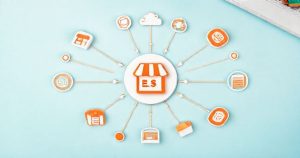Running a successful Etsy shop requires dedication, creativity, and a significant amount of administrative work. As your business grows, manual tasks like shipping, marketing, and accounting can become overwhelming, leaving less time for what you do best: creating. This is where Etsy integrations become essential. These powerful third-party applications connect directly to your shop, automating key processes, streamlining your workflow, and unlocking new potential for growth. By leveraging the right tools, you can save valuable time, reduce errors, and scale your operations efficiently.
Understanding Etsy Integrations
Etsy integrations are software tools and services that connect to your Etsy account through its Application Programming Interface (API). This connection allows for a seamless flow of data between your shop and the tool. For instance, when a new order comes in, an integration can automatically pull customer details, order information, and product specifications. This capability enables automation across various aspects of your business, from creating shipping labels to posting on social media, all without manual data entry.
The primary benefit of using these tools is efficiency. By automating repetitive tasks, sellers can reclaim hours each week. This not only reduces the risk of human error in order fulfillment or financial tracking but also allows you to focus on strategic activities. These include product development, customer engagement, and long-term business planning. Ultimately, Etsy integrations are a key investment for any seller looking to transition from a hobby into a scalable, professional business venture.
Top Print-on-Demand Etsy Integrations
Print-on-demand (POD) has revolutionized the way creators sell custom products. These Etsy integrations allow you to offer items like t-shirts, mugs, and posters without holding any physical inventory. When a customer places an order, the details are sent directly to the POD provider, who then prints, packages, and ships the product on your behalf. This model significantly lowers the barrier to entry for sellers wanting to expand their product catalog with minimal financial risk.
Two of the most popular print-on-demand Etsy integrations are Printful and Printify. Printful is known for its high-quality production and in-house fulfillment, giving you more control over the end product and branding options like custom labels. While its base prices can be higher, the reliability is a major draw. Printify, on the other hand, operates as a network, connecting you to a wide range of print providers globally. This often results in more competitive pricing and a larger product selection, though quality can vary between providers.
Choosing between them depends on your business priorities. If premium quality and consistent branding are your main goals, Printful is an excellent choice. If you are focused on maximizing profit margins and offering a diverse range of products, Printify’s vast network provides greater flexibility. Many successful shops use both Etsy integrations, selecting the best provider for each specific product they offer in their catalog to optimize both quality and cost across their entire range of goods.
Streamlining Shipping with Etsy Integrations
Shipping is often one of the most time-consuming aspects of running an online store. Manually copying addresses, purchasing postage, and updating tracking numbers for each order is inefficient and prone to errors. Shipping integrations automate this entire process. These tools sync with your Etsy shop to import all pending orders into a single dashboard, allowing you to manage them with ease. This centralization is crucial for maintaining organization as order volume increases.
Popular platforms like ShipStation, Pirate Ship, and Shippo are designed to simplify fulfillment. They automatically retrieve order details and allow you to purchase and print shipping labels in bulk, often at discounted rates compared to standard retail postage. Once a label is created, the integration automatically marks the order as shipped on Etsy and sends the tracking information to the customer. This level of automation ensures a professional and timely fulfillment process, improving customer satisfaction and your shop’s reputation.
Automating Your Marketing Efforts
Promoting your products beyond the Etsy marketplace is critical for driving traffic and building a brand. However, managing multiple social media accounts can feel like a full-time job. Marketing-focused Etsy integrations help automate your social media presence, ensuring your products are consistently showcased to a wider audience. These tools connect to your shop and can automatically create promotional posts for new listings, sales, or positive reviews, saving you countless hours of content creation.
Services like Outfy or Vela are designed specifically for e-commerce sellers. They can generate attractive posts using your product photos and descriptions and schedule them across platforms like Pinterest, Instagram, Facebook, and Twitter. By setting up automated campaigns, you can maintain an active social media presence even when you are busy with other tasks. This consistent marketing activity helps build brand awareness and directs potential buyers back to your Etsy shop, boosting visibility and sales.
Simplifying Accounting and Finances
Proper financial management is non-negotiable for any serious business, but it can be complex for Etsy sellers. Tracking sales, platform fees, material costs, and shipping expenses is vital for understanding your profitability and preparing for taxes. Accounting integrations eliminate the need for manual spreadsheets by syncing directly with your Etsy account to import all financial data automatically. This gives you a clear and accurate overview of your business’s financial health at all times.
Tools such as QuickBooks Self-Employed and GoDaddy Bookkeeping are popular choices that offer dedicated Etsy integrations. They automatically categorize your income and expenses, making it easy to see where your money is going. These platforms can also help estimate quarterly taxes, track mileage, and generate profit and loss statements. By automating your bookkeeping, you ensure accuracy, remain compliant with tax laws, and gain valuable insights to make smarter business decisions.
Conclusion: The Power of Smart Automation
Integrating third-party tools with your Etsy shop is a strategic move that enables sustainable growth. From product creation with print-on-demand services to seamless fulfillment with shipping software, these solutions handle the repetitive, administrative work for you. By automating marketing, accounting, and logistics, you free up your most valuable resource: your time. This allows you to focus on creating unique products, engaging with your customers, and building a brand that stands out, turning your creative passion into a thriving and efficient business.





